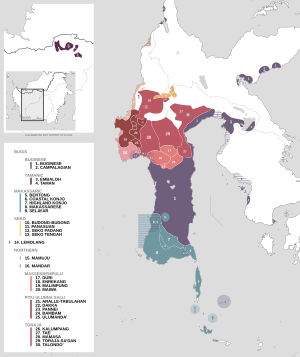Makassar languages
| Makassar | |
|---|---|
| Geographic distribution | Indonesia (Sulawesi) |
| Linguistic classification | Austronesian
|
| Subdivisions | |
| Language codes | |
| Glottolog | maka1310 |
 Map showing the distribution of the South Sulawesi languages in Sulawesi and Kalimantan. Languages within Makassar languages group, varying between number 6 to 10. | |
 Interactive map of Makassar languages, click the map Marker for further detail and navigation.
Interactive map of Makassar languages, click the map Marker for further detail and navigation. | |
The Makassar languages are a group of languages spoken in the southern part of South Sulawesi province, Indonesia, and make up one of the branches of the South Sulawesi subgroup in the Austronesian language family.[1][2] The most prominent member of this group is Makassarese, with over two million speakers in the city of Makassar and neighboring areas.
The status of the Makassar languages other than Makassarese as distinct languages is not universally accepted. In older classifications,[3] but also in recent studies by local linguists,[4] they are considered to be dialects of the Makassarese language.
Languages
[edit]Phonology
[edit]A characteristic feature of the Makassar languages is the occurrence of echo vowels with stems ending in final /r/, /l/ or /s/. E.g. /botol/ 'bottle' is realized as bótolo in Selayar and Coastal Konjo, and as bótoloʔ in Makassarese and Highland Konjo (the latter regularly adds a glottal stop to the echo vowel). This echo vowel is dropped if a suffix is added, but retained if followed by an enclitic.[5]
| Makassarese | Selayar | |
|---|---|---|
| base | /rantas/ rántasaʔ 'dirty' |
/lambus/ lámbusu 'straight' |
| with suffix | /rantas/ + /-aŋ/ rantás-aŋ 'dirtier' |
/lambus/ + /-aŋ/ lambús-aŋ 'straighter' |
| with enclitic | /rantas/ + /=aʔ/ rántasak=aʔ 'I am dirty' |
/lambus/ + /=a/ lámbusu=a 'I am straight' |
For Konjo (both Coastal and Highland Konjo), Bentong, Makassarese (Labbakkang dialect) and Selayar language, the consonant y /j/ and /w/ realized as j /ɟ/ and /h/.
| Makassarese | Coastal Konjo | Selayar | |
|---|---|---|---|
| pig | bawi | bahi | bahi |
| time | wattu | hattu | hattu |
| many, much | lowe,[i][ii] (jai) | lohe | lohe |
| rat, mouse | balawo[i] | balaho | balaho |
| wait | tayang | tajang | tajang |
| wood | kayu | kaju | kaju |
| look, find | boya | hoja | boja |
| to make | bayu,[ii] (pareʼ) | haju | (buaʼ) |
In Konjo languages, some initial b appears as /h/.
| Makassarese | Coastal Konjo | Selayar | |
|---|---|---|---|
| to look, find | boya | hoja | boja |
| hot | bambang | hambang | bambang |
Lexical differences
[edit]| Makassarese | Coastal Konjo | Selayar | |||
|---|---|---|---|---|---|
| Gowa (Standard) | Jeneponto | Bantaeng | |||
| to make | appareʼ | aʼbayu | anghaju | aʼbuaʼ | |
| to sit | ammempo | accidong | accidong | attolong | |
| hungry | cipuruʼ | paʼre | paʼre | paʼre | |
| rice field | tana | galung | galung | galung | |
| many, much | jai | loe | lohe | lohe | |
| why | angngapa | angngura | angngura | angngura | |
| friend | agang | urang | urang | urang | |
| with | siagang | surang | siurang | siurang | surang |
| water | jeʼneʼ | ere | ere | jeʼneʼ | |
| egg | bayao | bajao | tannoro | ||
| dog | kongkong | asu | asu | asu | |
| cat | miong | cammiʼ | cammiʼ, meong | meong | |
| leaf | lekoʼ | raung | raung | taha | |
| black | leʼleng | bolong | etang | ||
| white | keboʼ | pute | pute | ||
| eight | sagantuju | karua | karua | ||
| nine | salapang | salapang | kaʼassa | ||
| vegetable | gangang | utang | gangang | ||
| house | ballaʼ | ballaʼ, bola | sapo | ||
See also
[edit]References
[edit]- ^ Grimes, C. E. and B. E. Grimes (1987). Languages of South Sulawesi. Canberra: Department of Linguistics, Research School of Pacific Studies, Australian National University. doi:10.15144/PL-D78. ISBN 0858833522.
- ^ Friberg, T. and T.V. Laskowske (1989). "South Sulawesi languages". In: J.N. Sneddon (ed.), Studies in Sulawesi linguistics part 1, pp. 1-17. Jakarta: Badan Penyelenggara Seri Nusa.
- ^ Esser, S.J. (1938). "Talen". Atlas van Tropisch Nederland. Blad 9a. Batavia: Topografische Dienst.
- ^ Ramlah Mappau (2017). "Konstituen Pengungkap Negasi Dalam Bahasa Makassar Dialek Lakiung dan Turatea" [Constituent of Negation Expression in Makassarese Language Dialect of Laking and Turatea]. Sawerigading (in Indonesian). 23 (1): 127–137.
- ^ Basri, Hasan; Broselow, Ellen; Finer, Daniel (2012). "The end of the word in Makassar languages" (PDF). In Borowsky, Toni; Kawahara, Shigeto; Sugahara, Mariko; Shinya, Takahito (eds.). Prosody Matters: Essays in Honor of Elisabeth Selkirk. Advances in Optimality Theory. Sheffield & Bristol, Conn.: Equinox.
External links
[edit]- Makassar languages at Ethnologue (23rd ed., 2020).
